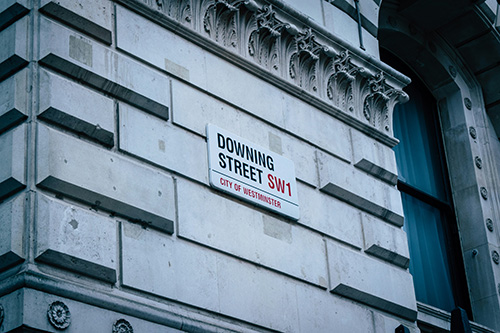
Photo by Nick Kane on Unsplash
From wartime speeches to parliamentary debates, British political figures have shaped not just history but the English language itself. Their memorable phrases appear in newspapers, television, and everyday conversation, making them valuable learning tools for international students.
Winston Churchill: Making History with Words
Churchill’s wartime spirit lives on in modern English through phrases that have evolved far beyond their political origins. His famous “Keep Calm and Carry On” demonstrates how British people express determination through understatement. Whilst the original wartime poster has become a popular cultural icon, modern British people often playfully adapt this phrase in everyday conversation. You might hear someone say “Right then, keep calm and make a cuppa” when facing a stressful situation, or friends might say “Keep calm and order takeaway” when discussing dinner plans. These casual adaptations show how historical phrases enter everyday British humour.
Churchill’s declaration “Never give in” appears regularly in modern contexts. In offices, you might hear a manager encourage their team with “We’re not giving in until we solve this,” whilst teachers often tell students “Don’t give in if you find it difficult at first.” This persistence in the face of challenges remains a common theme in British communication.
His famous “blood, toil, tears and sweat” speech has given modern English a pattern for expressing commitment. In job interviews, candidates often structure their answers similarly: “I’ll bring my experience, knowledge, dedication and enthusiasm to this role.” This four-part pattern has become a natural way to emphasise commitment in professional settings.
Margaret Thatcher: Powerful Expressions
Thatcher’s influence on English extends beyond politics through phrases that demonstrate determination. Her famous “The lady’s not for turning” introduced a structure that British people still use to show firmness. In workplaces, you might hear “I’m not for changing my mind on this one” during a debate about project decisions, or “She’s not for backing down” when describing someone’s strong stance on an issue. These adaptations maintain the original’s strength whilst fitting naturally into modern speech.
The Iron Lady’s phrase “There is no alternative” appears in everyday British conversation in subtle ways. You might hear someone say “Well, there’s no alternative, we’ll have to work late” when facing a tight deadline, or “There’s no alternative but to tell her the truth” when discussing a difficult situation. These uses show how political language naturally enters daily speech.
Tony Blair: Modern Political Language
Blair modernised political speech in ways that reflect contemporary British English. His famous repetition of “Education, education, education” has influenced how British people emphasise importance in conversation. You might hear someone say “The secret is location, location, location” when discussing house-hunting, or “What this needs is patience, patience, patience” when tackling a difficult task.
His phrase “tough on crime, tough on the causes of crime” created a pattern that appears in everyday discussion. People often say “I’m tough on deadlines, tough on excuses for missing deadlines” or “We need to be tough on mistakes, tough on why mistakes happen.” This structure helps English learners express complex ideas about solving problems.
Gordon Brown: Economic Language in Daily Life
Brown brought financial terms into everyday English. His emphasis on “prudence” made financial vocabulary more common in daily conversation. You might hear someone say “Let’s be prudent about this” when discussing anything from holiday planning to shopping decisions. His phrase “no more boom and bust” is often adapted to describe any situation requiring consistency: “No more feast or famine in our workload” or “No more rush and slack in our planning.”
Living Language in Modern Britain
These political expressions adapt naturally to situations that international students commonly encounter:
In the workplace, you might hear “Right, time to carry on” during challenging projects, echoing Churchill’s determination. When facing difficult decisions, British colleagues often say “There’s no alternative, we’ll just have to get on with it,” showing how Thatcher’s directness lives on in office culture.
At university, students might encourage each other with “We’re not giving in until we understand this,” drawing on Churchill’s spirit. During group projects, you might hear “We need focus, focus, focus,” showing how Blair’s emphasis technique helps express priorities.
Understanding British Communication
British political language teaches valuable lessons about modern communication in the UK. The tendency to combine humour with serious matters, as in “Keep calm and make a cuppa,” helps students understand British understatement. The way formal phrases become informal, like turning “no alternative” into “Well, no choice then, have we?” shows how British English naturally mixes different speaking styles.
Learning Through Daily Life
Living with a British host family offers unique insights into how these expressions work in real situations. Host families can explain when saying “I’m not for turning” might sound too formal, and when “Well, I won’t change my mind” fits better. They help students understand how political phrases become part of natural conversation, like using “carry on” instead of “keep calm and carry on” in daily speech.
Want to improve your understanding of British expressions whilst experiencing London life? London Homestays connects international students with British Council registered host families who share their knowledge of British culture and language. Our homestay programme helps you master both traditional and contemporary English usage through real-life experience.
Contact us to learn how our homestay programme can enrich your English learning journey through cultural immersion and daily practice.






